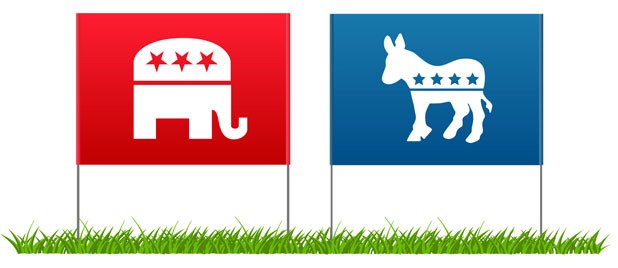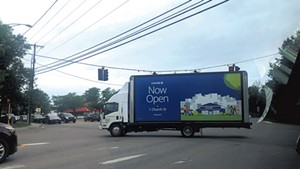
The autumnal equinox doesn’t always mark the date when fall foliage starts to turn, but in election years it’s a reliable indicator of when lawns, roadsides and greenbelts start showing their campaign colors. Like toadstools sprouting after an overnight rainfall, campaign yard signs seem to emerge out of nowhere on chilly September mornings, jockeying for the eyeballs of passing pedestrians and motorists.
It’s an odd phenomenon. In an age when most of us are inundated with electronic messages on a variety of platforms, virtually every candidate for elected office still relies on that lowliest of low-tech messaging devices: the sign. It’s almost insulting to think that voters’ loyalties can be bought as cheaply as the price of a piece of corrugated cardboard and a wire frame — about a buck and a half. Are voters actually that easily swayed?
In a word, yes. These mini-billboards — with a few exceptions, campaign signs are exempt from the state’s billboard ban — can be found in every city, town and village in Vermont for one reason: They work. In fact, according to one longtime printer, they’ve never been in greater demand.
“I’ve been in business 37 years, and I think they’ve become more popular,” says Melodie Bean, founder and owner of Vantage Press in Burlington, which prints many of the yard signs for Chittenden County candidates of all stripes.
Bean admits that her perspective as a printer may be somewhat skewed. But she offers a theory of why signs are effective: Emails and other electronic messages just don’t reach as many people.
“I work electronically all day,” she says, “so when I get home, the last thing I want to even consider looking at is more technology. No computer, no email, no Facebook, none of that at home.”
Fair enough. But plenty of registered voters are on the Internet in their free time. And virtually all candidates for elected office still feel compelled to leave their marks on every greenbelt, grassy knoll and tree-lined avenue, like canines with full bladders.
Eric Davis, professor emeritus of political science at Middlebury College, suggests that yard signs are simply an inexpensive way of creating name recognition, especially for candidates — such as those running for the legislature — who can’t afford broadcast or print ads or mailings.
“In some neighborhoods where yard signs are common, they can be a form of ‘one-upmanship’ among candidates [to say,] ‘I have more supporters than you,’” he adds.
Darcie Johnston, of Johnston Consulting in Montpelier, is a longtime political consultant for Republican and independent candidates. A former staffer for Sen. Jim Jeffords — her father also worked for Jeffords for many years — she’s been immersed in politics her entire life.
Johnston suggests a few reasons why lawn signs are still in vogue and haven’t been replaced by higher-tech media: They’re cheap and visible to a wide section of the populace, and they make it easy for candidates to show the depth and breadth of their support in a community.
Moreover, she notes that lawn signs reach the most “reliable” voters, meaning people who consistently turn out for every election: seniors. As Johnston points out, such voters are still well above the average age of users of social-networking sites such as Facebook and Twitter.
Finally, she offers another theory about lawn signs’ critical role in the political process: They remind clueless and undecided voters to go to the polls.
“For people like me, who live and breathe politics and were brought up in it my whole life, it would never occur to me not to know [that],” Johnston says. “But there are people who don’t have a pulse on it at all and have a hard enough time knowing there’s an election going on.”
Selene Hofer-Shall is managing partner of Theseus Advisors in Burlington, a political consulting firm that works exclusively with Democratic candidates. Her clients this year include Chittenden County state’s attorney T.J. Donovan and state senatorial candidate Philip Baruth.
Hofer-Shall suggests that lawns signs are like any other form of mass marketing: a device for generating “visual impressions” to create name recognition that lasts, at least through election day.
Sure, social-networking tools are cheaper and just as effective, possibly even more so among younger voters, she offers. “But we don’t have high-speed Internet in a good chunk of the state,” says Hofer-Shall, “so you’re not going to get a lot of people with Twitter and Google ads.”
Hofer-Shall confesses that she’s not a huge fan of lawn signs, either, and often reminds clients that an abundance of them doesn’t necessarily translate into votes. Nevertheless, she’s yet to meet a candidate willing to eschew them.
“I don’t think we’re there yet,” Hofer-Shall admits, “though I’d love to see that day.”
Wouldn’t we all.










Comments
Comments are closed.
From 2014-2020, Seven Days allowed readers to comment on all stories posted on our website. While we've appreciated the suggestions and insights, right now Seven Days is prioritizing our core mission — producing high-quality, responsible local journalism — over moderating online debates between readers.
To criticize, correct or praise our reporting, please send us a letter to the editor or send us a tip. We’ll check it out and report the results.
Online comments may return when we have better tech tools for managing them. Thanks for reading.